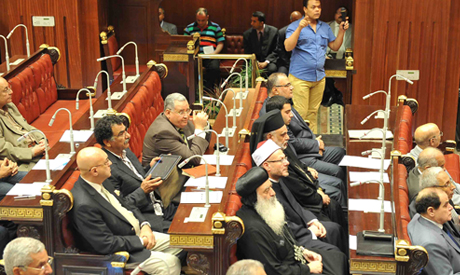
Committee session to amend the Constitution (Photo: Al-Ahram)
The committee responsible for amending the Egyptian constitution has resumed its work after a brief halt by members angry at the recent detention of protesters.
The committee suspended its work on Tuesday when a number of demonstrators who were protesting in central Cairo against the inclusion of military trials for civilians in the new constitution were detained.
Under the provisions of a new law on protests which came into force this week, protests or demonstrations that have not received prior permission from the police are forbidden.
A member of the committee, Hussein Abdel-Razek, told Ahram Online the sessions were resumed because "the primary goal is to finish the constitution."
In reaction to fierce confrontations between the security forces and protesters, 13 members of the committee asked to halt the sessions on Tuesday in solidarity with the detained, while two members froze their membership of the committee. All 15 members were present at Wednesday's session, Abdel-Razek said.
At least 50 protesters were arrested during Tuesday's demonstrations against the inclusion of military trials for civilians in the new constitution.
Twenty-four remain in custody on Wednesday pending investigations on charges including rioting, organising a protest without notifying authorities, disrupting the public interest, blocking roads and thuggery.
A week earlier, 30 members of the committee voted in favour of an article allowing civilians to be subject to military trials. There will be further committee votes on the article and on the complete draft text of the charter in the coming days.
The text of the article states that military courts may try civilians in cases related to direct attacks on military premises, properties, zones and border areas, or on military vehicles or personnel who are carrying out their duties. Crimes related to military documents, secrets or funds are also included in the article.
Abdel-Razek said that work was halted yesterday because committee members objected to the detention of members of the pressure group No to Military Trials for Civilians.
"They were protesting against us. We are a party in the conflict and we think this is their opinion. It's anybody's right to disagree with us as long as the protest is peaceful," he said.
Abdel-Razek said that the new protest law does not organise protests as much as it "restricts and takes away the right to protest.”
A final version of the protest law was issued Sunday after being approved by interim President Adly Mansour.
Controversial articles include requirements on protest organisers to notify authorities three days in advance of their aims and demands, heavy prison terms and fines for individuals who break the law, as well as escalating measures that security forces can deploy in dispersing protests.
Abdel-Razek said discussions will take place in order to determine the next step to help get the detained protesters released.
"We want to achieve two things that may seem contradictory: objection and pressure for the release of the detained whatever their political affiliation is, and going through with the [transitional period’s] roadmap, which means not delaying the constitution," he said.
Short link: